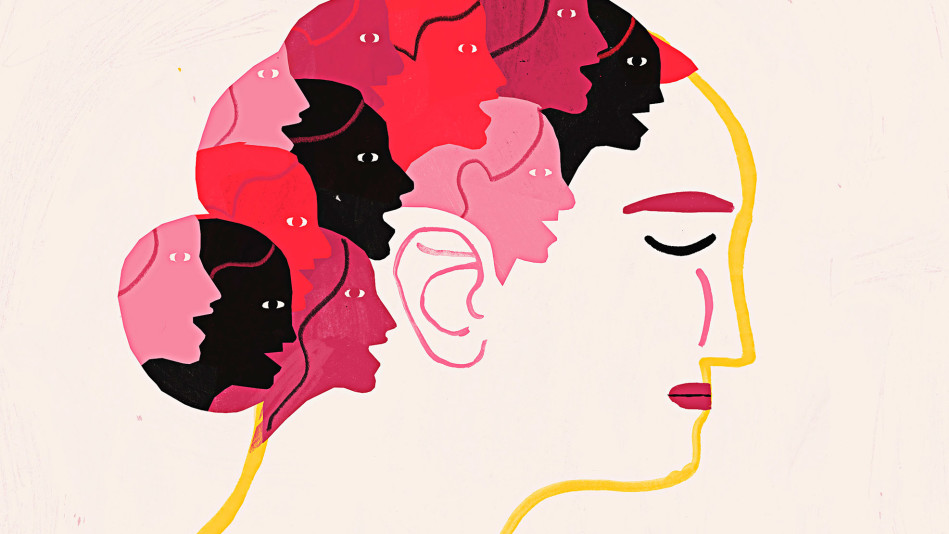Why It's Okay to Say You're Not Fine
Let's stop pretending we don't have opinions and raise our voices.

Illustrations: Keith Negley
A friend recently told me she was feeling lost. Her youngest child had just left for college, and with him had gone her meaning and purpose. The night before, her husband had asked her, "Honey, now that you can do whatever you want with your life, what do you want to do?" She didn't know what to say. She just stared at him, thinking, I don't know what I want for dinner—forget about what to do with my life. I have no idea. How can I even start to figure it out?
When someone invites me to think about what I want, I try to pause, take a moment to be still, and check in with my inner self until a kind of knowing rises and points the way.
Some call that voice intuition; others say it's God, or wisdom. One person I know refers to the voice as Sebastian. The point is, what we call it doesn't matter; what's important is that we hear it.
But women are taught that the way to be successful and attractive to the world is to be selfless. From an early age, we are conditioned to ignore the voice within when considering who we are and what our goals are, and instead to look outward—to our family, friends, church, community, and even our critics. In a million different ways we ask them: What should I want? What should I be? And the more our inner whispers fade from disuse, the more our bodies speak up, trying to get our attention. We get tired. We get sick. We can't sleep. And we ignore these voices, too. If you refuse to listen to anybody long enough, she'll stop speaking. Which is why one day we realize we have lost our way.
My teenage son and his friends were hanging out in our family room one weekend, and I popped in and asked, "Are you hungry?" The boys kept their eyes on the screen and yelled "Yes!" in unison, while the girls paused—searched one another's faces—then smiled and said, "We're fine." See what happened there? The boys checked in with their stomachs. The girls checked in with each other. A while later, I tried again: "Girls, I've got pizza and chicken. What do you want?" There was a long silence while two of them looked over at the third. She paused, smiled politely, and said, "Sorry. I don't care. Whatever they're having is fine."
That's when I decided we needed to have a little chat. I thought of the countless times I've apologized for no reason and said I was fine when I wasn't. When we shrug and say we don't care, it's usually a lie. Every girl cares. We've just been taught not to expose ourselves by showing it. What the world needs now is girls and women who aren't afraid to care—who are done saying "whatever."

I called the girls into the other room and sat them down on the couch. I told them they'd learned some rules about being a girl, that the world's taught them that girls aren't supposed to be hungry, have opinions, make decisions, or say what's on their mind until they've gathered permission and consensus. I pointed out that every time I'd asked them what they wanted, they looked at the boys or one another, pretending they didn't know in an effort to make everyone else happy. I reminded them it's not their job to get smaller in voice and opinion and body—to disappear—in order to accommodate others. Their voices and opinions are important, I told them, so they need to figure out what they want, believe it on the inside, and speak it on the outside. And then I said, "Okay, let's practice. Do you really believe boys should go ahead and eat and want and decide everything while you just sit on the floor and watch them?"
One of the girls looked down, and then at me, and said, "No. I'm always hungry when I say I'm not."
"Me, too," I said. "I'm always hungry, too. And I'm usually not so fine, either. Let's stop saying things that aren't true."
The second girl said, "I don't know how to know what I want."
I said, "Sometimes, in the beginning, you have to trick your inner voice into yelling so you can start to recognize it."
I went through my purse, found a coin, and held it up.
"Get ready," I said. "I'm going to flip this coin. If it's heads, we're having pizza. If it's tails, chicken. While it's in the air, call out how you want it to land." And before they could think, I flipped the coin. All three girls yelled out "Heads!" without pausing or looking at one another.
"There it is," I said. "There's your self. You didn't have time to overthink or consult everyone else in the room." The coin toss is a way to trick your inner voice into screaming until you can hear it whispering. I use it to ask myself what I want instead of asking the world what it wants from me. It helps me forget about being perfect and focus instead on being free.
I think they got it, although it was hard to tell amid the noise of girls chomping on pizza.
Glennon Doyle Melton is the author of Love Warrior, a 2016 Oprah's Book Club Pick; the founder of the online community Momastery; and the creator of the nonprofit Together Rising.
When someone invites me to think about what I want, I try to pause, take a moment to be still, and check in with my inner self until a kind of knowing rises and points the way.
Some call that voice intuition; others say it's God, or wisdom. One person I know refers to the voice as Sebastian. The point is, what we call it doesn't matter; what's important is that we hear it.
But women are taught that the way to be successful and attractive to the world is to be selfless. From an early age, we are conditioned to ignore the voice within when considering who we are and what our goals are, and instead to look outward—to our family, friends, church, community, and even our critics. In a million different ways we ask them: What should I want? What should I be? And the more our inner whispers fade from disuse, the more our bodies speak up, trying to get our attention. We get tired. We get sick. We can't sleep. And we ignore these voices, too. If you refuse to listen to anybody long enough, she'll stop speaking. Which is why one day we realize we have lost our way.
My teenage son and his friends were hanging out in our family room one weekend, and I popped in and asked, "Are you hungry?" The boys kept their eyes on the screen and yelled "Yes!" in unison, while the girls paused—searched one another's faces—then smiled and said, "We're fine." See what happened there? The boys checked in with their stomachs. The girls checked in with each other. A while later, I tried again: "Girls, I've got pizza and chicken. What do you want?" There was a long silence while two of them looked over at the third. She paused, smiled politely, and said, "Sorry. I don't care. Whatever they're having is fine."
That's when I decided we needed to have a little chat. I thought of the countless times I've apologized for no reason and said I was fine when I wasn't. When we shrug and say we don't care, it's usually a lie. Every girl cares. We've just been taught not to expose ourselves by showing it. What the world needs now is girls and women who aren't afraid to care—who are done saying "whatever."

I called the girls into the other room and sat them down on the couch. I told them they'd learned some rules about being a girl, that the world's taught them that girls aren't supposed to be hungry, have opinions, make decisions, or say what's on their mind until they've gathered permission and consensus. I pointed out that every time I'd asked them what they wanted, they looked at the boys or one another, pretending they didn't know in an effort to make everyone else happy. I reminded them it's not their job to get smaller in voice and opinion and body—to disappear—in order to accommodate others. Their voices and opinions are important, I told them, so they need to figure out what they want, believe it on the inside, and speak it on the outside. And then I said, "Okay, let's practice. Do you really believe boys should go ahead and eat and want and decide everything while you just sit on the floor and watch them?"
One of the girls looked down, and then at me, and said, "No. I'm always hungry when I say I'm not."
"Me, too," I said. "I'm always hungry, too. And I'm usually not so fine, either. Let's stop saying things that aren't true."
The second girl said, "I don't know how to know what I want."
I said, "Sometimes, in the beginning, you have to trick your inner voice into yelling so you can start to recognize it."
I went through my purse, found a coin, and held it up.
"Get ready," I said. "I'm going to flip this coin. If it's heads, we're having pizza. If it's tails, chicken. While it's in the air, call out how you want it to land." And before they could think, I flipped the coin. All three girls yelled out "Heads!" without pausing or looking at one another.
"There it is," I said. "There's your self. You didn't have time to overthink or consult everyone else in the room." The coin toss is a way to trick your inner voice into screaming until you can hear it whispering. I use it to ask myself what I want instead of asking the world what it wants from me. It helps me forget about being perfect and focus instead on being free.
I think they got it, although it was hard to tell amid the noise of girls chomping on pizza.
Glennon Doyle Melton is the author of Love Warrior, a 2016 Oprah's Book Club Pick; the founder of the online community Momastery; and the creator of the nonprofit Together Rising.



